Items
Identifier is exactly
HST643
-
2024-03-14
A lifelong Dream Journey to Egypt
At the height of the pandemic, I was in Arizona working in the Maricopa County Supreme Court system. In transparency, there were not very many restrictions, let alone travel restrictions. Additionally, several times I was able to leave the state and go visit my family in my hometown of California which had several different restrictions such as a complete shutdown as well as social distancing and wearing a face mask. Once travel restrictions were lifted, I did not take any specific big trips, due to my living/daily life experiences not being drastically changed living in Arizona during the pandemic. I was still going into the office everyday, in court everyday, and able to do many of the same activities that I would do on a daily basis. As an additional note, if I could travel anywhere in the world, I would love to visit Egypt, specifically Cairo. For as long as I can remember I have had a great fascination with ancient Egyptian history. During my free time, I love watching documentaries about the discovery of ancient Egyptian artifacts and what they symbolize. Being able to actually see Egyptian artifacts personally, would allow me to gain a deeper understanding of ancient life in Egypt. On this trip, I would also like to see the Giza pyramid complex. Pyramid construction and symbolism is another great interest of mine. Recently I have started watching a documentary called, Lost Tombs of the Pyramids, and it exploration and excavation of pyramids. Overall, on this trip, I would document this trip using photography and videography. Those are what I normally use to document trips taken. I like this method because I am able to go back and physically look at sites in my camera roll if I ever wanted to. I have never been outside of the United States, and I hope to accomplish the goal of traveling out of the country soon! -
0012-03-20
The Day the World Changed
On March 12th, 2020, I found out the fate of the remainder of my first spring semester as a college student. I don’t remember much about days during quarantine, but I do remember specific details of this day. It was the week before Spring Break for UAB, and all students were preparing for a week off from school. That weekend, my family was planning a trip to New Orleans for the weekend as my mother’s employer offered her a free two-night stay at any hotel of her choosing. My dad and I were planning to finally visit the National World War Two Museum. As my friend and I were walking to dinner at a local poke place in Five Points South, I received my first email that my English class would remain virtual for the remainder of the semester. My professor had Type 1 Diabetes and did not want to risk his health. Shortly after, the entire student body of UAB received an email that students would not return to campus until April 1st, 2020, at the earliest. While some students decided to pack up all of their belongings and take them home with them, others truly believed we would be coming back on April 1st. I decided not to take my belongings with me and traveled four hours to my hometown for the extended break. I went home that Friday, March 13th, 2020, after taking my midterm for Biological Anthropology. Once I arrived home, my parents made the decision to cancel our trip as the spread of COVID-19 was unknown at this time, and they did not want to risk going to a public and crowded place like New Orleans. Instead, my father and I traveled four hours back to Birmingham to pack up my dorm room and bring my belongings home. At this time UAB had completely shut down and was limiting access to campus and the dorms. They only allowed me 15 minutes to get any belongings needed. After that trip, UAB officially closed for the remainder of the term and students belongings were moved out of the dorms by moving companies to make room for healthcare workers. We did not get the chance to go on our New Orleans trip until over two years later, in 2022. I planned a big trip for my 21st birthday with my friends and family. While most restrictions have been lifted, people were still wearing masks, and businesses were still enforcing the three- to six-foot social distancing. I wasn’t surprised, as just earlier in the year, my employer required face masks for the spike in COVID cases in Birmingham. I remember going to restaurants and we were required to wait outside for our table. In the National World War Two museum, there were stickers on the floor that represented how far we should stand from each other. While many of the restrictions, including the social distancing and wearing a mask, had been lifted, it was nice to see that people were still making it a point to follow them for the safety of themselves and others. -
2023-05-19
Griffith Observatory
The Griffith Observatory is located in Los Angeles, California, where COVID-19 restrictions were lifted in February 2023 statewide. This picture was taken in May of 2023, just a few months after the Observatory stopped asking for proof of vaccination before letting you in and lifted its face mask mandate. I had been to the Observatory several times before the pandemic, but I stopped once the pandemic hit. Although the Observatory was open during the pandemic, it required visitors to wear face masks and show proof of vaccination before allowing them to enter the facility. -
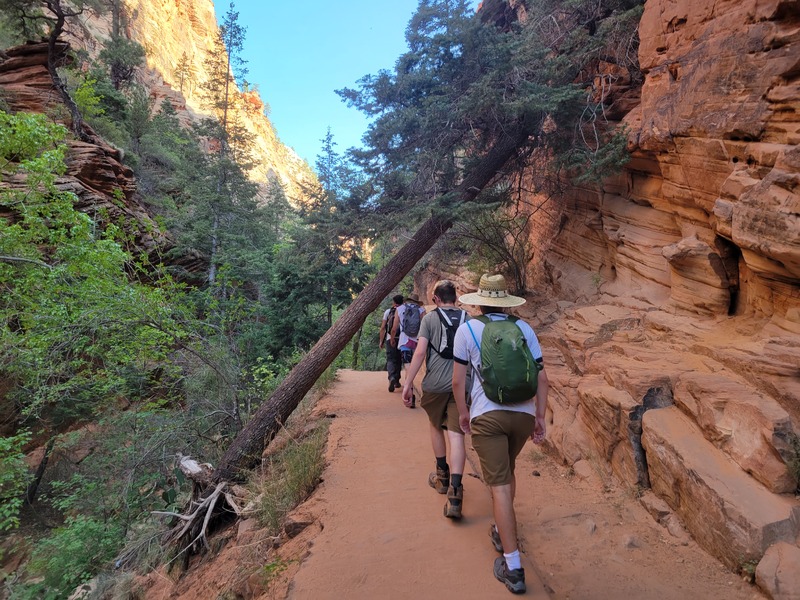 2021-07-23
2021-07-23The Trail to Angel's Landing
There are few ways to describe the events of 2020 other than chaotic. The vast, sweeping changes that occurred left many confused and grasping, often in desperation. Meanwhile, 2021 was a mixed follow-up for a year where much remained the same, but travel restrictions began to lift. Seeing this window of opportunity, four friends and I leaped at it. We planned a weeklong trip to Zion National Park and on the first day, we headed for Angel's Landing. The situation around the pandemic resulted in a kind of claustrophobia that superimposed a hyperawareness of personal space. For many, where six feet distance apart was not just a courtesy in some establishments, but a rule that was often enforced. This condition of anxiety or even fear of contracting COVID-19 from another person in the limited size of restaurants, cafes, and grocery stores was easily felt. This kind of spatial awareness bled into one's perception so deeply that it might be retroactive. While watching a pre-pandemic movie with a shot of a crowd, the thoughts would intrude, "Where are everyone's masks?" or "Why is everyone standing so close together." Southern Utah is a great expanse of mesas, mountains, and bluffs under a rolling sky. Zion reflects this in the great size of the rock formations and the verdant greenery accompanying it. The contrast in scale highlights the simple fact that getting up to the tallest point of Angel's Landing is an exercise of walking upwards at steep inclines, often with other people in front of you, creating a line. Maybe it was the change in setting, but for a while, it was as if the pandemic was left behind. Everyone still brought masks, wore masks in crowded environments, and used hand sanitizer but the anxiety was not there. It appeared to be the common rule that the other tourists had agreed to. Replacing the fear was a determination to get to the highest point of the trails and photograph the scope of it all. It was only the first day of the trip and I had already been astounded. -
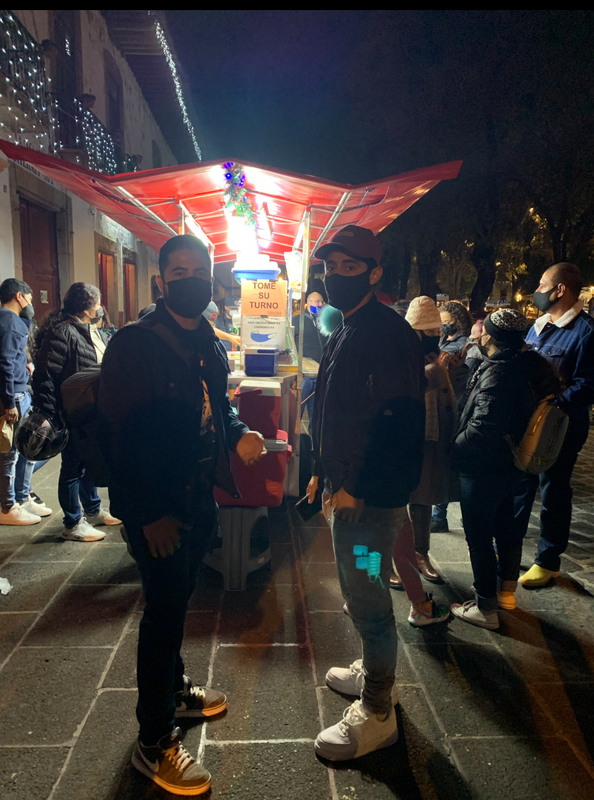 2020-12-26
2020-12-26Everyday life amidst a global pandemic
When the covid restriction lifted my husband and I decided to visit family in Mexico. Because of the ban we were not able to attend funerals, birthday parties or any type of celebration. Despite the pandemic and the restrictions life seemed to be about the same 8 months after the pandemic had first been announced with some small changes. In a street corner waiting to order food, everyone was wearing masks. The elderly, children and the vendors themselves which was surprising considering the push back there happened to be originally from the Latin communities. The solidarity in the mask enforcement had now came from fear. The people in the streets were scared but had to continue their jobs as vendors and others having to go out side and purchase from these same vendors despite the fear of getting sick. When I think back to the first year of the pandemic I think about small moments like these, something as simple as purchasing street food now came with a worry of possibly getting yourself or others sick. -
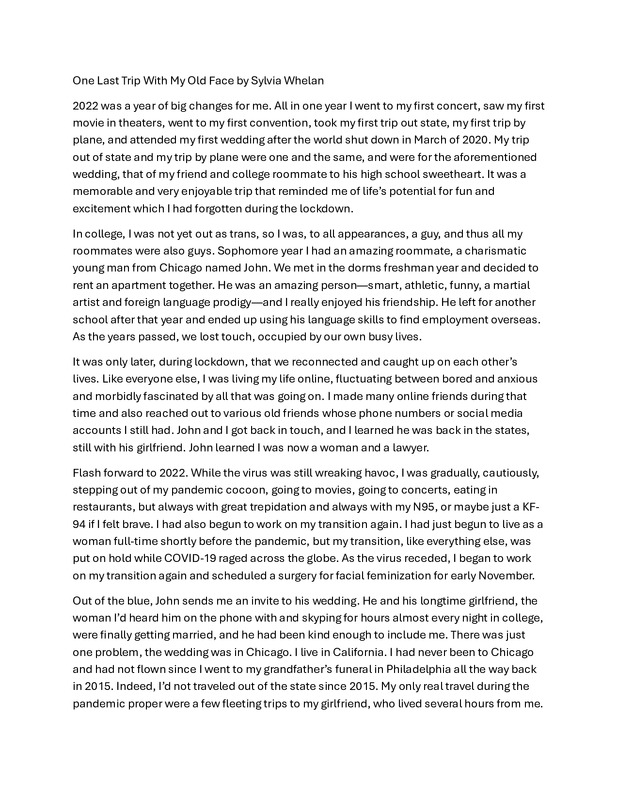 2022-10-16
2022-10-16One Last Trip With My Old Face
This is a story about my first trip out of state after the pandemic began. During lockdown, I reconnected with an old friend and was later invited to his wedding. It was my first time going to Chicago and I had a wonderful time. -
2024-03-14
Multiple Covid Trips
When travel restrictions were lifted, did you take a trip? If so, where did you go and why? What are your memories of this trip? Were there any continuing COVID-19 restrictions in place? I swear I have no strong political opinions, but I looked at the stats for 30-something men for COVID, and decided I'd just go for it and refused to ever hide (except for that time I got Covid in July 2020). I went on SEVERAL trips. Also, I was a teacher in a VERY conservative area (read: students and parents were aggressively anti-Covid measures) and my wife was a nurse. I figured I was bound to get Covid and ruled a personal judgment of "Who cares? Especially if it's inevitable as this stuff spreads like glitter ..." I was a teacher and then delivered Ubereats nonstop as a form of "time travel". But we took the following Covid trips: May 2020 to Houston/Galveston. June 2020 to Colorado (Between these trips, I decided to focus on working and saving to buy a house as everything was shut down worldwide, there were no more trips to make) June 2021 to Port Aransas, Texas August 2021 to Colorado again (wife is from Colorado, thus the repeats) March 2022 to Northern Finland (Lapland) and was able to spend about an hour in Sweden, since we rented a car. August 2022 - Went to Costa Rica for the wife's 30th birthday. (Covid restrictions were gone by this trip). May 2020 to Houston/Galveston was a bit strange. I got asked to pick up a painting for my parents at her friends' house and so we turned it into a birthday trip for me. Hotels and beach were curiously packed and Texans simply did not care about COVID at this point. June 2020 to Colorado - George Floyd riots/protests (your decision) shut down downtown Denver and put us in a curfew where we couldn't leave the house after 8:00PM, so that was interesting. Still enjoyed the mountains and the fresh air, but we couldn't do much in Denver. The interesting thing at this point was the "two weeks to flatten the curve" was being revealed to be wrong, so we didn't know what to think anymore after this. August 2021 to Colorado - I have little in the way of memories of this trip. Wife really wanted to go. We saw more mountains and more of her friends. We ran away from a giant black creature in the woods (BEAR!) that was revealed to be a black cow and my wife makes fun of me for this to this day. More scared of that "bear" than I ever was of Covid. March 2022 to Finland - This was interesting. Finland was completely open and the primary restrictions were the US Government requiring masks on planes. We had to get a booster in order to go, which annoyed me, but I did it. The service in the airport was fascinatingly horrible and we were delayed by about 36 hours to Finland, which means we just missed the last Aurora of the winter. They also lost and then broke my wife's luggage. We drove around Northern Finland and even popped into Sweden for an hour because "Why not?". Other funny thing was everyone was very scared for us, because Russia had just invaded Ukraine and I had to reassure everyone that after the Winter War and World War II, Russians decided Finland was haunted and to never return (for historical accuracy, this is a joke, but it was a fun joke). I liked Finland/Lapland, but it was more expensive then Tokyo. I've never been anywhere more expensive in my life. Gas was somewhere in the range of $11/gallon, due to the invasion (on top of already high European prices). We met Santa, I got bit by a reindeer and sled dogs are a rambunctious bunch of creatures. We slept in the ice hotel you see sometimes in travel blogs. The stores were all open. Everything was open. Finland simply did not seem to care about Covid and my understanding was Sweden didn't either (part of the reason we shrugged and popped over). I had literally one person one time ask me to put on a mask when I went into a store, but this annoyed us and we left. August 2022 to Costa Rica - Flew in and out of Liberia, Costa Rica (not San Jose) for reasons I don't remember - I think I did that because I was desperately trying to make it an open-Jawed trip (fly in to Liberia and fly out of Panama City). I remember being annoyed because I told my wife repeatedly that "I don't think Costa Rica will be as cheap as everyone has told you" and it wasn't. It's pretty and nice. It's not really cheap at all. Interesting thing here is there were absolutely ZERO Covid restrictions. Nothing. None. Not one. Over. The story was over. So I'll end it there. -
2021-06-14
Family Trip to Florida 2021
My father is a world class powerlifter who has podium placed at world championships before. He was planning to do the qualifier for the next world championship in 2020, but that was understandably delayed. When stay at home orders were lifted, he competed in the state level qualification event, in his case North Carolina, for the national championship. He had to lift in a mask, which was uncomfortable and potentially dangerous as lifters could not always get enough oxygen during and after a lift causing some to pass out and need medical attention. He did well enough in the qualifier to proceed to the national championship in Daytona Beach, Florida. On that trip, COVID restrictions were very few, if any, with the hotel, lifting event, and restaurants/stores not having mask mandates or vaccination checkpoints. Unfortunately, my dad did not win this championship. He did, however, come back the next year and won the 2022 championship in Orlando, Florida. When we went on that trip, COVID precautions were not really present at all, and it almost seemed life it was before COVID. -
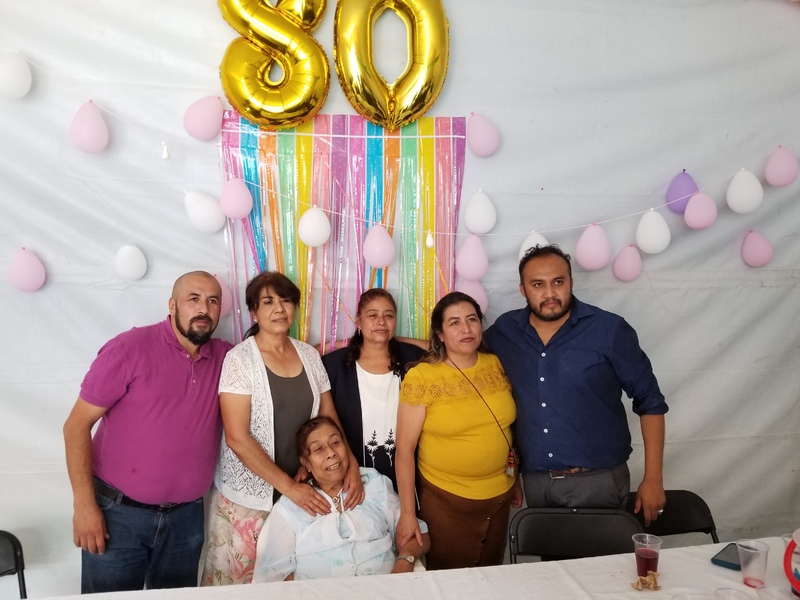 2021-07-30
2021-07-30Covid Was Over
In 2021 my Mom and I planned a trip to Mexico to visit her side of the Family. We had been putting off the trip because of a lack of money and then Covid hit. It had been seven years since my mom had been able to visit her mother and her siblings. At this point in time, travel restrictions and quarantines were largely a thing of the past. People in my area no longer considered Covid to be a threat in the way it was viewed in the early part of 2020. Masks weren’t in common use and people went about as they pleased. Deaths were still rising. By June of 2021 our trip took place. Most of the big travel restrictions had been lifted, but oddly enough America still had testing restrictions for reentry. Mexico, a nation that still cared about limiting the spread of the virus, had no testing or vaccination requirements for entry. We went on our trip and had a great time visiting our family in Mexico City. While staying we decided to visit the Museum of Anthropology in the city center. To enter, we had to go one at a time and be sprayed with some sort of sanitization chemicals by guards in the front. Being a poor Spanish speaker I was afraid I would do something wrong and that they wouldn’t let me enter. Thankfully everything went well at that time. When the time came to leave we had to locate a pharmacy that would do rapid testing for our return trip. America had very specific instructions that only allowed for certain pharmacies to do the testing. This made it very difficult to find one that would work. When we got to the testing site it reminded me of zombie movies. The pharmacy was surrounded by tall iron fences with razor wire at the top. People wanting to be tested were funneled one by one to a testing kiosk. The kiosk itself was a glass paneled box complete with attached glove arms and a ventilation system. The test itself was a simple swab test that was much more painful than I thought it would be. My nose hurt for an hour afterward. On the day of our departure I was nervous that something would not be correct with our records and we would be stopped from leaving Mexico. The person who officially went over our records was in the baggage check in area. She took our documents and didn’t even look at them for one second before handing them back. I was confused but this, since our American travel sites made such a big deal about it. Honestly, we could have easily faked the records to get back into America. Ultimately we got home safe and sound. A little over a month later everything went to hell. My cousin, Aunt, and Abuelita all contracted Covid and were hospitalized. My Aunt and Abuelita passed away from the virus, only my cousin survived. My mom had to deal with the loss of two close family members less than two weeks apart. It felt so wrong, how could they have both died when Covid was over? -
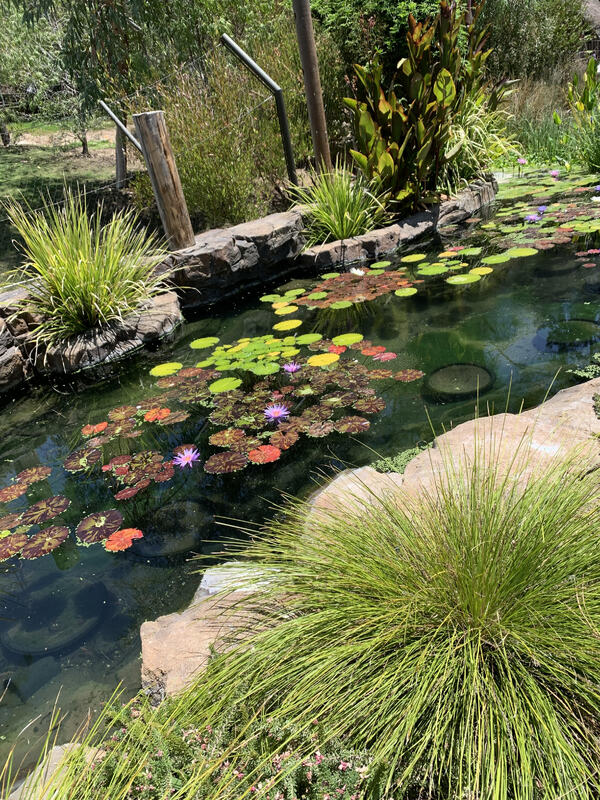 2021-07-27
2021-07-27San Diego Zoo Safari Park
Looking back at my camera roll, I chose this picture as the subject of this assignment. The picture reminded me of the first trip that I took, a year after COVID happened. The summer of 2021, my family and I were able to take a trip to San Diego, California and we decided to go to the San Diego Zoo Safari Park. I am a lover of nature and I enjoy the scenery and being able to appreciate the simple beauty of plants and animals. As any other normal traveler would do, I snapped a bunch of pictures as I was walking through the safari park zoo. I snapped this picture as I was on the tram and we were observing the large animals (rhinoceros, giraffes, etc.). This particular picture spoke to me, becuase I saw it as the first time I could actually enjoy the simplicity of having the means to travel and enjoy the beauty of the outside world, after being cooped up for so long. Since I live in the Phoenix area, it is not often that I get to see lily ponds or vibrant plants/animals in my area. I remember feeling free and appreciative of having the means to travel and see the outside world again. -
2022-05-20
The time I travelled to Punta Cana
When the restrictions were lifted, I took a trip to Punta Cana in the Dominican Republic right after finishing my internship and getting ready to graduate. Originally, I was supposed to go in November with my family, but we couldn't because my parents and sister got COVID. Unfortunately, we had to reschedule the entire trip. During that time, I had to isolate in my room, wear a mask inside the house, and wash my hands frequently. This time, it was just us traveling. When we were getting ready to board the plane, we needed our vaccine cards. My dad got a bit worried, thinking I might have forgotten mine, and had a mild panic attack. In the area, many people weren't wearing masks since the requirements had been lifted and they were no longer mandatory. However, I still noticed quite a few people wearing masks, even boarding the flight. Our rooms were spacious; my parents had their own room, and my sisters and I had ours. We stayed at an all-inclusive resort, where drinks, food, and activities were available all day long. One memorable part of the trip was going on a boat excursion where we got to snorkel with other travelers and see various fish below us. It felt like COVID was a thing of the past, but there were still reminders like stickers and signs in both English and Spanish reminding us to stay six feet apart. Overall, it was a fun trip that helped take my mind off the stress of the pandemic, although there were still reminders here and there. -
2020-12-30
Travelling in December 2020 and January 2021
I remember first hearing about COVID-19 in January of 2020. There were concerning reports that Chinese authorities were wielding apartment doors shut to contain the virus, which was certainly a bad sign, and I was fairly certain that if those measures were being taken, the disease was a big deal. I followed the developments fairly closely from my parents' home in Oklahoma. In late March, around the time of my 21st birthday, I was working as a substitute teacher at the high school I graduated from. I was able to work one singular day before the virus shut down the school district. The next few months were full of changes. Uniformed National Guard personnel staffed vaccination centers, groceries were delivered directly to houses, and entire industries went work-from-home. By the time December rolled around, the initial panic had mostly died down, and many travel restrictions were lifted. I needed a break. I decided to catch a ride with a buddy of mine from Indiana who just so happened to have family here in Tulsa. I bought a plane ticket to facilitate my return trip. We have some mutual friends in Zionsville, a little suburb of Indianapolis, and we collectively decided that we wanted to have a New Years party. Here in suburban Oklahoma, many of the mask mandates had been dropped by this point, but it was still prudent to carry a mask in the somewhat rare event that a business owner preferred patrons cover their faces. It was much the same in Zionsville, but businesses in Indianapolis proper, in my experience, were much more strict. I understood that COVID-19 was a serious health risk, and that it was smart to wear a mask, but it was somewhat confusing to go from a place that seemed so carefree - and admittedly irresponsible - to a place that was still mandating face coverings. The party with my friends went well and many margaritas were consumed. It was a much-needed break. The locations with the strongest COVID restrictions were perhaps the airports. It made sense to me, since airline travel likely contributed a great deal to the initial spread of the disease. Regardless of reasonability, masks were worn the entire duration of the flight. The entire cabin smelled of sanitation wipes, and the airport felt somewhat emptier than I was used to. This was Indianapolis' airport. I had a layover in Dallas and that Airport felt much more lively, in that sort of carefree way I was accustomed to back in Oklahoma. Masks were still required on the plane itself. I landed back home late in the evening without too much excitement. It was nice to take my mask off when I got into my mom's car. Overall, the trip made me realize that different states and regions were treating the ongoing pandemic very differently. While New Years was a welcome break from the monotony of the initial quarantine year, the trip did raise questions about my state government's commitment to public health and safety. -
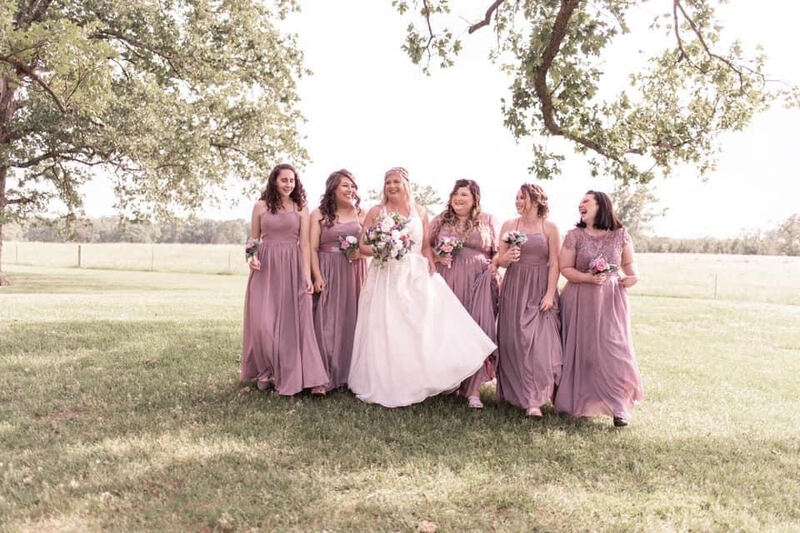 2021-06-07
2021-06-07A Pandemic Wedding
My friend had been planning her wedding for nearly two years when the pandemic hit, and suddenly, she had to put all of her plans on hold. It was a devastating moment for her and everyone who was looking forward to the special day. When travel restrictions were lifted, her bridal party (including me) rushed to get plane tickets to ensure our presence by her side in small town, Texas. We wanted everything to go perfectly for her considering the delay she endured and the preparations that were now unclear. It was an outside wedding filled with beautiful twinkling lights, neatly placed wooden benches, and masks, sporadically, spread throughout the crowd. A year after the lockdowns and restrictions, Covid 19 still affected people enough to don masks outside during a wedding. Despite the residual fear, my memories of spending time with friends, eating good food, and cheering on the beautiful bride are happy ones. -
2023-06-06
A Journey East: Exploration of Singapore & Southeast Asia
Sitting in our small kitchen during our first full school year of teaching since the Pandemic my fiancé and I scribbled the names of places we'd like to travel to on scraps of paper and threw them into a bowl. Swriling them round and round I reached in and pulled out a piece of paper with "Singapore" scribbled on it! Elated that we'd chosen one of our dream destinations we immediently set about preparations for our jounrey - booking a cruise that embarks from Singapore and stops in Maylasia and Thailand. Our flights took us from Phoneix to Los Angeles for a brief layover and then an extensive flight to Tokyo, Japan. He stayed in Tokyo for nearly 48 hours - longest layover - and were able to catch up with my host family - I had previously visited Japan pre-pandemic in 2019 and stayed with a family there. I expected Covid regulations to be quite strict in Japan, though they were incredibly lax! Here we were, sharing drinks and a meal in a small, noisy, crowded restruant in the heart of Tokyo. Everything seemed to have reverted back to pre-pandemic rythms in my observations. These observastions would become quiote commonplace throughout the rest of our trip. Landing in Singapore, our cruise didn't set sail for 4 days, so we explored every inch of the city! Staying in the Clarke Quay distirct of Singapore, we were centrally located to many distinct and excting locations such like: Chinatown, Little India, Gardens by the Bay, Orchard Road, The Marina Bay Sands Hotel and the Singapore Zoo! Each location was inrecdible and unique in its own special way. The bustling streets and open air hawker markets of Chinatown and Little India buzzed with excitement as crowds of people shuffled back and forth from tables to but more food or in and out of shops and temples. The city was alive and thriving which gave both my fiancé and I so much joy! Singapore and Southeast Asia for the larger extent, had been quite extreme in their COVID lockdowns and draconian in punishment if COIVD protocal was broken. So we were overjoyed when life returned to normal in these parts of the world. One night in Chinatown, we sat down to a wonderful meal of beef, chicken, and shrimp Satay - meat on a stick - accompanied by a cold pitcher of Singapore's finest beer - Tiger. We were eating in the center of a packed night market. This night market stretched for two to three city blocks and was jammed with people enjoying anything from ice cream to chicken feet. As we enjoyed our meal, two men sat next to us and we engaged in a breif conversation. The conversation became prolonged and we eventually learned that one of the men was an Arch bishop in the Catholic Church and an Ambassador of the Vatican to Singapore! He shared many wonderful stories of his time living all over Southeast Asia and gave us some advice and sights to see as we continued our travels. Our cruise set sail and we embarked on the second leg of our adventure! Sailing the strait of Malacca, we visited cities in Malaysia such like: Kuala Lumpur, and Georgetown! We hired a private guide in Kuala Lumpur to show us around the city for a day - this was probably one of the best decisions we'd made on the trip. We got such a personal view of the city as our guide took us not only to various temples, memorials, and landmarks, but also to his favorite local stops! From Port Klang and Kuala Lumpur, we sailed to Georgetown where we climbed their famous Hill and explored the city and all of his rich colonial, Chinese, and Indian heritage. Our final destination for our cruise was Thailand, and it did not dissapoint! Taking a shore excursion, we travelled to Ao Phang Nga National Park visiting the famous James Bond Island and a floating Thai-Muslim village. After an awesome day of travel, we made our way back to the Ship and began our jounrey back to Singapore. Making it back safe and sound to the US, my fiancé and I reflected on our trip and were both incredibly grateful that all travel and experience had returned to normal following the Pandemic. The COVID-19 Pandemic and its restrictions were an after thought at these destinaitons. Not to say these countries have abandoned all sense of proticetion from the virus, rather they seem to have - like most of the world - pivoted to a stance that COVID will always exist now, and we must all collectively "deal with it" much like the Flu. With this experiance under our belts, we are both exicted to venture back out into the world and explore all it has to offer! -
2021-03-18
A Burial Post Pandemic
I did not travel during the entirety of the strict lockdown period of the COVID-19 Pandemic. My wife and I worked in retail and were deemed essential so we worked through it from April 2020 until the restrictions were broadly lifted. In March 2021 my mother died of an unrelated illness, the first trip I took after the travel restrictions were lifted was to bury her in Carlsbad, New Mexico. We did not hold a funeral service and we did not hold a memorial, she was cremated and buried quietly. I remember this very vividly because even at that time it felt wrong to travel and to be interacting with people in a way that wasn't required by work. We wore masks the entire time. Due to our proximity to El Paso, TX I remember vividly when they were storing bodies in buses in the streets there and this made us fearful and cautious. Even had we not been still in the throes of the pandemic, I don't think I would have done anything differently but I do believe that the added stress of travel would not have been present thus making the trip more manageable. Due to our need to isolate, and resist getting sick, what I remember most of all is the loneliness of the matter, and the quiet car rides, and wondering 'How might things have been different?' -
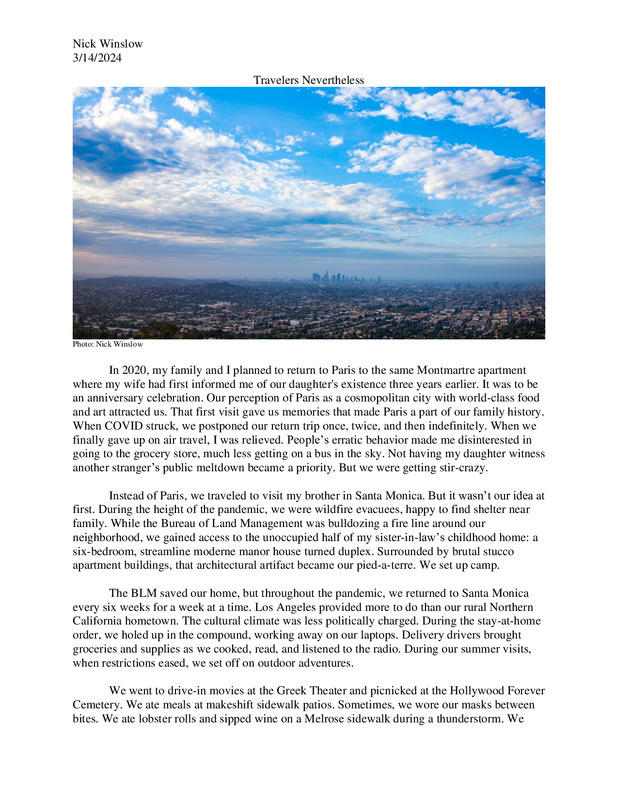 2020-03-22
2020-03-22Travelers Nevertheless
Faced with the impossibility of international travel during the COVID-19 pandemic, my family embarked on an unplanned intrastate adventure that led to a deeper appreciation for the city of Los Angeles and for family members that call that city home. Along with posing serious day-to-day challenges, the pandemic created opportunities for new relationships with people and places. -
2022-06-22
The Two-Week Road Trip
When COVID-19 shut everything down in March 2020, I was in the middle of student teaching and preparing to take my last teaching certification exam. My college graduation was moved to a PowerPoint presentation, and summer plans were canceled. The first year of my teaching career was hybrid. I had a small portion of my students in person, and a majority tuned into my world geography class via Zoom. In my second year of teaching, things were slowly returning to normal. Asynchronous and synchronous schooling was no more, and students had to attend in person while wearing masks and trying to maintain social distancing as much as possible in a high school. During this school year, my family planned a two-week road trip to explore historic sites in the United States on our journey from San Antonio, Texas, to Eau Clair, Michigan. On this road trip, we traveled through and stopped in eight states. In the Summer of 2022, I embarked on a two-week road trip from June 19th to July 2nd with my mom, my younger brother, and my grandma to visit family in Illinois and Michigan. It was chaotic and wonderful at the same time. We traveled through Arkansas, Mississippi, Tennessee, Kentucky, Illinois, Indiana, Michigan, and Missouri until returning to Texas. Travel restrictions at this point were lax or nonexistent in the states we traveled to, and many people we encountered acted as if COVID-19 had never happened. Masks were hardly worn, and social distancing was gone, although signs recommending the six-foot distance still lingered around different locations we stopped at. I, however, carried hand sanitizer with me religiously and had a mask with me in case it was needed. Because of how relaxed the COVID-19 safety restrictions were in the states we traveled through, my family and I were convinced we would get sick. Luckily, we did not, but whenever we returned to the car after a sightseeing excursion, we always said, “There’s no way we didn’t get COVID that time.” We were most convinced that we had come into contact with the virus in Chattanooga, Tennessee. While in Chattanooga, we went up Lookout Mountain and into Ruby Falls. Ruby Falls is a series of caverns that lead to the tallest and deepest underground waterfall in the United States. You must descend in an elevator to get down to the cavern entrance. There were no mandatory mask signs or social-distancing warnings to board the elevator, only a weight limit. So, my mother, younger brother, and I squeezed into an elevator with about twenty maskless people and descended into the cave. On the cave tour, we were still in close quarters but were able to spread out a bit more. We traveled into the depths of the caverns until we made it to the waterfall, took our pictures, and then road back up to civilization again, compacted into an elevator. We traveled and stopped in many different places, each with various rules and restrictions regarding how that establishment was handling COVID-19. Our elevator ride at Ruby Falls was the most surprising part of our trip. This elevator ride made me feel as if people had forgotten the entire COVID-19 epidemic had occurred. My surprise was mainly influenced by the precautions I had to take as a teacher, and going out into the “wild” opened my eyes to how different parts of the country were coping with the aftermath of the epidemic. I observed many people's attitude on our road trip: "Let's just get back to normal.” -
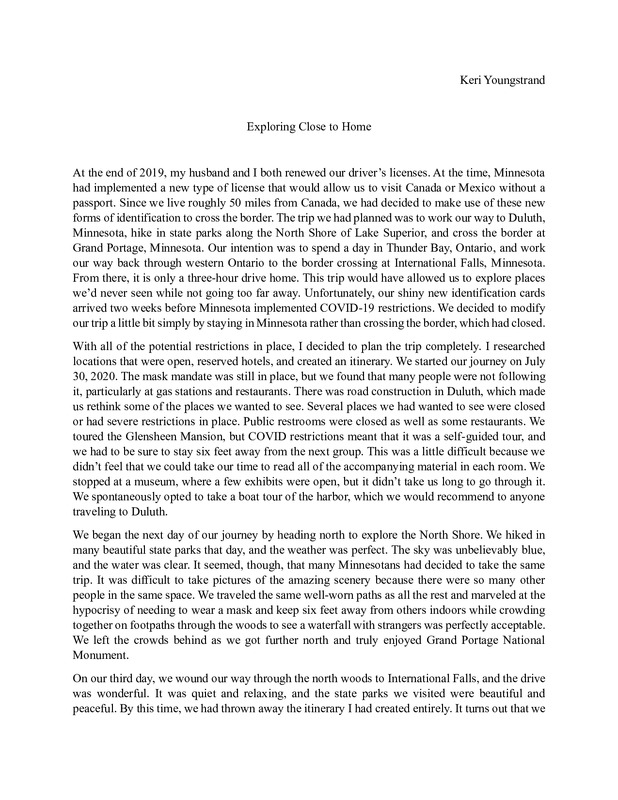 2020-07-30
2020-07-30Exploring Close to Home
This story describes the first trip that my husband and I took during the pandemic. It was at the July 30 - August 1, 2020, and we took our first trip without children in twenty years. The pandemic shaped this trip completely. First, we could not cross the border we had wanted to cross, which meant we stayed in our home state. Second, we researched destinations in ways that we never had before. Finally, the pandemic had forced many other people to seek outdoor vacations, which led to large crowds in many of the parks we visited. -
2024-12-10
Visiting Maui with Respect to Native Traditions and Local Population
Since travel restrictions were lifted on the island of Oʻahu, I still have not traveled outside the island. One place that I am keen on traveling to is the island of Maui because it is one of the main Hawaiian Islands that I have not yet explored. Prior to the devastating Lahaina wild fires in August 2023, I was deeply interested in understanding the cultural richness and historical significance of Lahaina. Now, if I get a chance to visit Maui, I would be mindful of the trauma that continues to inflict pain on the local and native populations of Maui. Therefore, I would avoid the area of West Maui and instead explore the main cities of Kahului and Kihei to better understand why Maui continues to be a tourist attraction for Americans. Near Kihei, the site of Haleakala observatory is a common tourist attraction for locals and foreigners. The ongoing debate over tourism development and the restoration of native practices is ever-present on Maui. Tourism on Maui was just recovering from the economic consequences of the pandemic and the economic hardship was again devastated by the Maui wildfires. If I were to document my trip to Maui, I would use a journal to understand the complex dynamics between the state government, tourism industry, and local and native populations. I would also use my journal to record what tourist sites continue to recover from the pandemic in spite of the wildfire catastrophe. -
2021-03-11
Missouri Travels A Year After COVID
In 2020, the COVID-19 pandemic shut everything down, and the world went into a global lock down. A year later, restrictions started being lifted and my mother and I traveled to Osage Beach Missouri, as well as the surrounding areas. Because Osage Beach was a tourist town on a lake most of the local attractions were closed due to it being the off season. It was March of 2021. Previously, my family had loved going to Missouri, but always had gone to Branson. We chose Osage Beach, however, because we could get free accommodations through my parents timeshare points. The day I remember most of the trip was traveling to St. Louis, Missouri to visit the St. Louis Zoo. The day before going we had to book a time slot in order to reduce our chances of being exposed to COVID and in order for the zoo to know approximately how many people were there. We did not have to wear medical masks outdoors, since we were fully vaccinated, but when in areas like the gift shop or some dining facilities we had to wear masks. If a zoo worker asked to see our COVID vaccine cards we had to show them or put on masks. After visiting the zoo, my mom and I went to a local pizza pub in Osage Beach that had St. Louis style pizzas. They were not as concerned about the COVID regulations and did not enforce any mask or social distancing policies that the St. Louis Zoo had. This was a theme of Missouri restrictions as I saw when I toured the Missouri State Penitentiary in Jefferson City. There I was not required to wear a mask or social distance, but group numbers were limited and reservations had to be made. Luckily my mother and I did not get COVID during the trip, but after a year of lock down and restrictions, the few restrictions still in place felt like a culture shock, even though I still lived in Texas at the time. -
2022-06-25
Exploring Cairo
I visited Cairo in the summer of 2022. I decided to upload a picture of myself overlooking the city of Cairo. It was my first time visiting a Muslim country and a non-Western country. This was the main reason why I wanted to go. I chose to upload this picture because it reminds me of the awing experience of taking in Cairo for the first time. There were still a few Covid-19 restrictions in place at the time, but the Egyptian authorities didn't seem too interested in actually enforcing them at the airport or anywhere else. I took this photo on Anthony Bourdain Day (June 25th). Anthony Bourdain and his show are one of my major inspirations to travel and experience the wider world. -
 2021-10-21
2021-10-21Phoebe Bridgers at the Greek Theatre
I was able to get tickets to see Phoebe Bridgers in LA October of 2021. My best friend and I drove out there from Arizona. It was an amazing show at the Greek Theatre, which is a beautiful venue located in Griffith Park. This was the first time I travelled to see a concert, and since it has become something that I do often. I've even been back to the Greek Theatre three times since and already have tickets to a show there later this year. During this time, there was still a lot of Covid-19 restrictions in place. Even though it was an outdoor concert venue everyone still wore their masks the whole show and we had to show our vaccination cards upon entry. -
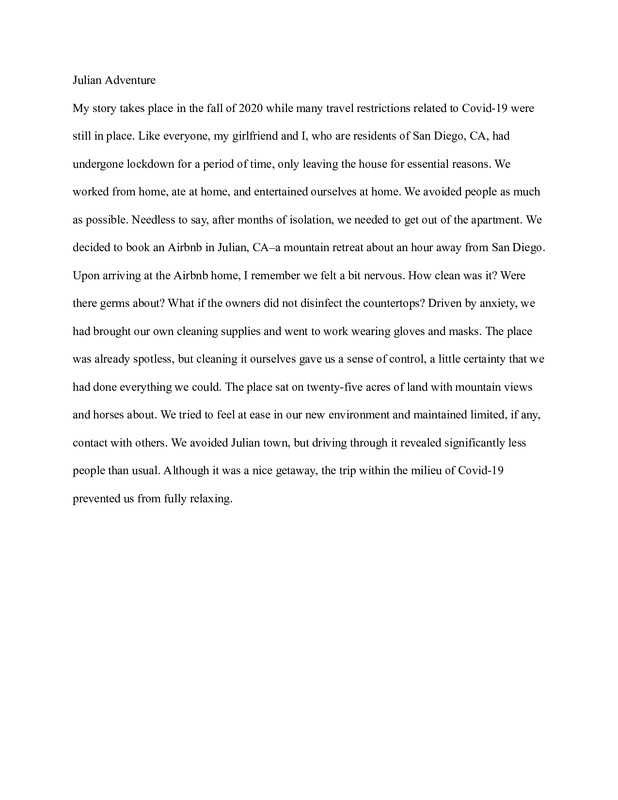 2020-10-22
2020-10-22Julian Adventure
Julian Adventure My story takes place in the fall of 2020 while many travel restrictions related to Covid-19 were still in place. Like everyone, my girlfriend and I, who are residents of San Diego, CA, had undergone lockdown for a period of time, only leaving the house for essential reasons. We worked from home, ate at home, and entertained ourselves at home. We avoided people as much as possible. Needless to say, after months of isolation, we needed to get out of the apartment. We decided to book an Airbnb in Julian, CA–a mountain retreat about an hour away from San Diego. Upon arriving at the Airbnb home, I remember we felt a bit nervous. How clean was it? Were there germs about? What if the owners did not disinfect the countertops? Driven by anxiety, we had brought our own cleaning supplies and went to work wearing gloves and masks. The place was already spotless, but cleaning it ourselves gave us a sense of control, a little certainty that we had done everything we could. The place sat on twenty-five acres of land with mountain views and horses about. We tried to feel at ease in our new environment and maintained limited, if any, contact with others. We avoided Julian town, but driving through it revealed significantly less people than usual. Although it was a nice getaway, the trip within the milieu of Covid-19 prevented us from fully relaxing. -
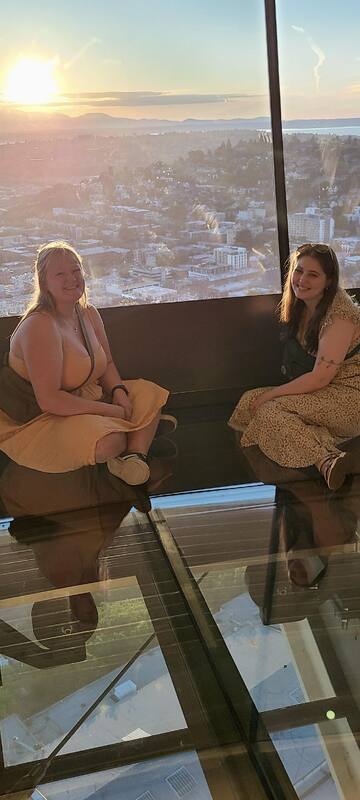 2023-07-13
2023-07-13Post-Pandemic Trip to Seattle
Like it did for many people, the start of the Covid-19 pandemic canceled multiple travel plans for me. I applied for my passport in 2018 with the intention of going on a study-abroad trip my junior year of undergrad. Instead of travel memories, I have a memory of sitting in my PoliSci class and discussing the news with my classmates that the university might shut down for a few days. We didn’t go back, and I still haven’t used the passport. Once travel restrictions were lifted it still took me a while to get back out into the world. The first trip I took was in July of 2023. I traveled from Minnesota to Seattle, Washington with some of my friends from high school for a week of sightseeing. We chose it because most of us had never been to the Pacific Northwest. It was my first time in an airport since December of 2018. I remember having quite a few lingering anxieties related to Covid, to the point where I was actually dreading the trip before we left (even though I ended up having a wonderful time). I had some struggles with health anxiety during the pandemic. Before tests were widely available I remember frequently being so paranoid I had Covid that I would convince myself I did and actually make myself feel sick with anxiety. Since restrictions have been lifted this has stuck around, and now takes the form of me getting excessively anxious about getting Covid before important events (like the trip, and my wedding just a few weeks before it). I also was nervous about going to the airport because I didn’t know what to expect in regards to how many restrictions would still be in place. It turned out there were no restrictions remaining in the MSP or SeaTac airports beyond some signs reminding people to not enter if they felt unwell (I am certain most people who make it far enough to see the sign still enter). Once the actual boarding of the plane went fine, I entertained myself with anxieties about the odds of someone on the plane having Covid and all of us breathing circulated air. I actually had Covid once in the fall before the trip, and got the highest fever of my life but was ultimately okay. Interestingly, this didn’t really ease my fears during the flight. Nobody got Covid from the Seattle trip (though we were probably just lucky) and instead I got some of the most precious memories of my life so far. I also had a surprising lack of anxiety once we got there. We visited a long list of places including most notably the Space Needle, Chihuly Garden and Glass Museum, Seattle Aquarium, Pike Place Market, and the National Nordic Museum. There were no Covid-19 restrictions remaining in any of these places. I had packed one reusable mask in my backpack in case I needed it, and it turned out the one time on the whole trip that I entered a space where masks were required (a small independent bookstore) I didn’t have it with me and had to borrow one. I still thought about Covid every time we pushed through a packed crowd in Pike Place Market, but more so than being afraid I thought about how during the peak of the pandemic I was convinced it was something I would never do again. I don't believe the pandemic is truly over even now, but I drastically felt how much things had changed in that moment. The picture I included to tell my story is of my friend Carlie and I on the top of the Space Needle (I am sitting on the right). We went back twice, and spent literally hours sitting on the glass floor and watching the city go by as it slowly rotated. It's one of my fondest memories of the trip. I’ve heard some people say the Space Needle is overrated, but as small-town Midwesterners we were pretty fascinated. I’m grateful to those who spent the pandemic under harsher restrictions in bigger cities like Seattle so that I can visit these places now. It was nice to feel so small looking down on Seattle after the world felt so small during restrictions just a few years earlier. -
2021-10-11
Disney Wedding 2021
My wife and I were supposed to go to her best friend's wedding in the fall of 2020. Well, with millions of other weddings and events that year, it had to be postponed. The wedding ended up taking place at Disney world in the fall of 2021. We flew from New York to Orlando, and I remember that everyone was still wearing masks in the airports and on the planes. And if I remember correctly masks were required on the plane for the whole ride. While staying on Disney property and in the parks, masks were required inside buildings. But outside you could have them off. During the wedding, which was on Disney property, we did have to wear masks for the ceremony, and while dancing, but at the tables, we could take them off. Still, it was a magical time, and the VIP access to the Epcot fireworks is still my favorite memory. Even now, in 2024, I will still wear a mask if I go on a plane again, or public transportation. That is something from the pandemic I think will definitely stick with me for the rest of my life. -
2020-09-07
Pandemics & Wildfires
The year 2020 was challenging for me in a couple ways. Like so many others, the pandemic lockdown kept me home for several months. I continued school online with my local university and waited for it all to be over. As summer rolled around, my family had decided that if we were going to be isolated from others, we might as well do it somewhere we love. We spent the better part of our summer at my great grandfather’s cabin at Huntington Lake in the High Sierras. It was a fairly quiet season at the lake considering California was still under many restrictions. Shortly after our last visit, the Creek Fire started. The fire burned nearly 380,000 acres of the Sierra National Forest for about four months. Within a week of the beginning of the fire, we lost our family cabin and the historic general store, Cressman’s, that our cousins had just taken over. Our family was devastated, and it is still a very painful memory. I am, however, incredibly grateful for the last summer we got to spend there. In a strange way, the COVID-19 pandemic offered our family a small blessing in disguise. Since the lockdown required many to reduce work hours, a number of friends and family members had the opportunity to visit the cabin one last time. This photograph is a reminder of a very bittersweet summer. Although 2020 proved to be an especially challenging year, the pandemic allowed my family to make its final memories of our second home before it was gone. -
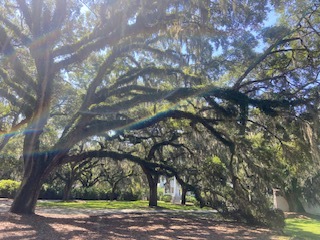 2023-07
2023-07Boston & Italy During Covid; Civil Rights Trip 2023
Prior to the world-stopping "Covid Times," my friends and I had planned to travel to Boston, MA. We were going to watch a Braves v. Red Sox game, visit Salem and the Freedom Trail in Boston. We had tickets, airfare, lodging etc. Then the world shut down. Because of life circumstances, we had to delay further after the world opened back up, and decided to shift gears and take a different trip. This would be a Civil Rights trip in the Summer of 2023. Again, life circumstances created the need to adjust. Two members of our group (half of us) were no longer able to travel, so myself and the other member of our group went. The trip was great. We flew into NC, then drove to Charleston where we spent a couple days. It was great because we were able to visit several places which were very impactful to both of us. McLeod Plantation was a wonderful & educational experience. We were given a fantastic guided tour where we learned much about the enslaved people who made the plantation function, and then about their descendants, some of whom lived there until the 1990's. We also visited the Old Slave Mart which was one of the most prominent sites in Charleston for slave sales. It has now been turned into a museum and memorial. From Charleston, we visited Savannah. We were only there about 12 hours, but were able to visit the house of a very prominent slave trader and see the living and working quarters of the people enslaved there. From there, we went to Atlanta (I got to watch a game at Truist Park!) for the night, and then on to Montgomery. If we could do it again, I would spend much more time in Montgomery. We visited the Legacy Museum which was, in a phrase, life changing. The experience was phenomenal and extremely visceral. I think it is something every American should experience at least once. We spent the whole day, and barely scratched the surface. And that was just the museum and monument. From Montgomery we drove to Selma and were able to walk the Edmund Pettus Bridge. We also drove around town a little and were able to see some of the churches, and neighborhood that were so influential in the Civil Rights Movement and the powerful Selma to Montgomery March. From there, we went to Memphis where we visited the National Civil Rights Museum. That was also a wonderful experience. This was such an awe-inspiring trip. It was very quick, but it was fantastic. It is a trip that I would take again though next time for longer. -
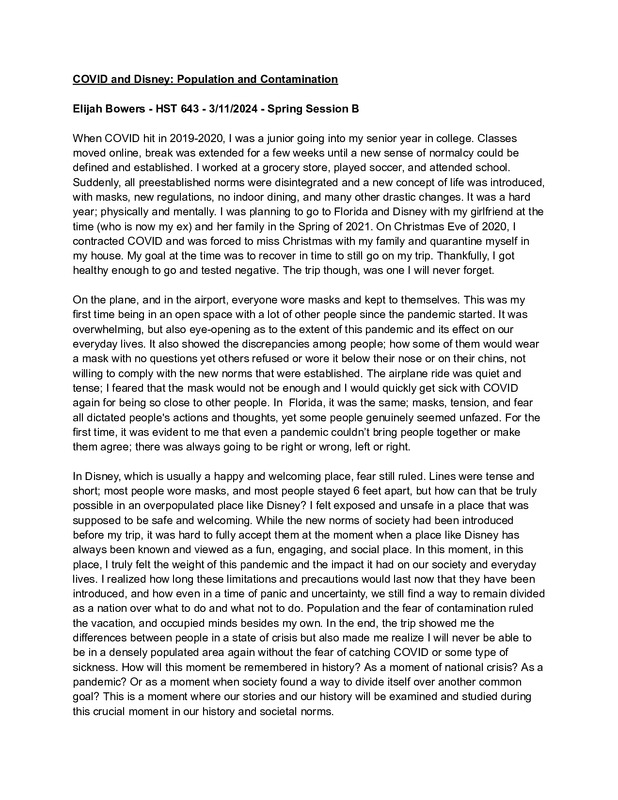 2020-12
2020-12COVID and Disney: Population and Contamination
This story discusses my trip to Disney and Florida following the pandemic, and the lasting effects it had on me, society, and the world as we knew it, as well as the differences among people in how they handled this event. -
2024-03-09
A Trip to the Algarve
In October 2021, my wife and I went to Portugal for two weeks. It was our first trip since the start of the COVID-19 pandemic. We went to the southern coast of Portugal, the Algarve. Our purpose was a reconnaissance with an eye to relocation. We'd been toying with the idea of moving overseas for several years. Spain had long been at the top of our list––we spent almost three months in Andalusia a decade earlier and fell for the place––but the Spanish tax and import regulations were a bit difficult, so we looked next door to Portugal. Portugal had inviting tax and import regulations. By that October, Portugal's COVID-19 travel restrictions had eased. You just had to have up-to-date vaccines and documentation of a recently conducted, negative test. That was easy enough, so the time was right for getting on a plane. The more difficult thing was returning to the United States. For that, we had to get another COVID-19 test within hours of travel, it had to be of a certain type, and it had to be administered and certified by an approved agency. Fortunately, a company had cracked-the-code on meeting the requirements through online monitoring of a self-administered test. We bought and took with us three tests each––backups to the backups. The strangest-feeling part of the whole trip was the hours-long layover in Newark on the outbound leg. People were walking around without masks on, and we reluctantly took our masks off to eat. We had both received boosters of the Moderna vaccine, but we felt naked and vulnerable. We left our masks on throughout the flight. After landing in Lisbon, we got our rental car and drove a couple hours to Albufeira. It's a coastal town about dead-center on the southern coast. We stayed in a house, which we rented because we wanted to make our own meals. Portugal is not much of a culinary destination––the best meal we had in a restaurant was a simple margherita pizza. On top of that, we are vegetarians, and my wife has a shellfish allergy, neither of which works well in a food culture based upon seafood and pork. Also, because this was a reconnaissance with an eye to establishing residence, it was important to shop around and see the pricing and availability of goods. An unexpected opportunity to do some shopping came early in the trip. My wife and I had packed for the typical Algarve weather for this time of year: cool, windy, occasional rain. Instead, what we got was very hot and very dry. So, it was off to the mall to reconfigure our wardrobe. We found that we dislike Portuguese malls just as much as we dislike American malls. But we like beaches and long hiking trails, and the Algarve coastline has plenty of that. This is where Portugal shines: miles and miles of walkable beaches, and miles and miles of coastal trails. Our days were spent driving to, and then walking trails and beaches at, coastal destinations along the entirety of the Algarve coastline. We also like friendly people, and the Portuguese are definitely that. My wife and I have travelled extensively, typically staying in each destination a month or more, and the Portuguese are at the top of the friendliness scale. Two days before our departure, we took the US-mandated COVID-19 tests. We logged into an online teleconference system and self-administered our tests at the direction of a talking-head on the screen of our laptop computer. We both received negative test results, which we forwarded to the airline. Then we drove to Lisbon, where we spent our last two nights in a downtown hotel. We walked around the city for hours, quickly discovering that we had arrived on one of Portugal's many holidays. But we were impressed by Lisbon as a city that felt safe and walkable, much unlike typical American cities of similar size. Our return flight was easy on the Portuguese end. On the American end, we met the lines and discourtesy typical of the US customs process. Then we caught a connecting flight to Richmond, Virginia, and from there drove a couple late-night hours to our house in Tidewater Virginia. A year after this trip, we moved to Portugal. As I type this, we have been residents for seventeen months. We currently live in the Algarve, a twenty-minute drive from the house we rented in 2021. The long beaches and friendly people more than made up for the bland food and the trip to the mall. -
2021-03-15
ARUBA 643
In March of 2021, my girlfriend and I went to the beautiful island of Aruba. I had been several times prior, but this was her first trip there. Neither of us had traveled outside of the US since the inception of the pandemic and we both were a bit concerned. I think some of the concern came from getting so much varying information. Who to believe was always a bit of a question. Several friends had gone prior to us and had very different experiences. The real disconnect seemed to be about getting their required return test for COVID. Several of the people we spoke with displayed their anger at how the test was administrated. They stated the brush had “gone into their brain”. Understanding the exaggeration made the concern no less worrisome. Despite what we heard, we went anyway and had an amazing time. Aruba is one of my favorite places in the world and I had been several times before. Being familiar with many of the spots helps navigate and lessons with anxiety. Two days before we went home, we arrived serious to take our tests. The bush seemed to be of normal size and my girlfriend bravely went first. She came out and jokingly claimed that it really hurt. The cruel joke caused me some concern, but I went through and was surprised to find no problem at all. We had a great time, and perhaps the lesson learned is to explore things for yourself to find the right answer to your questions. -
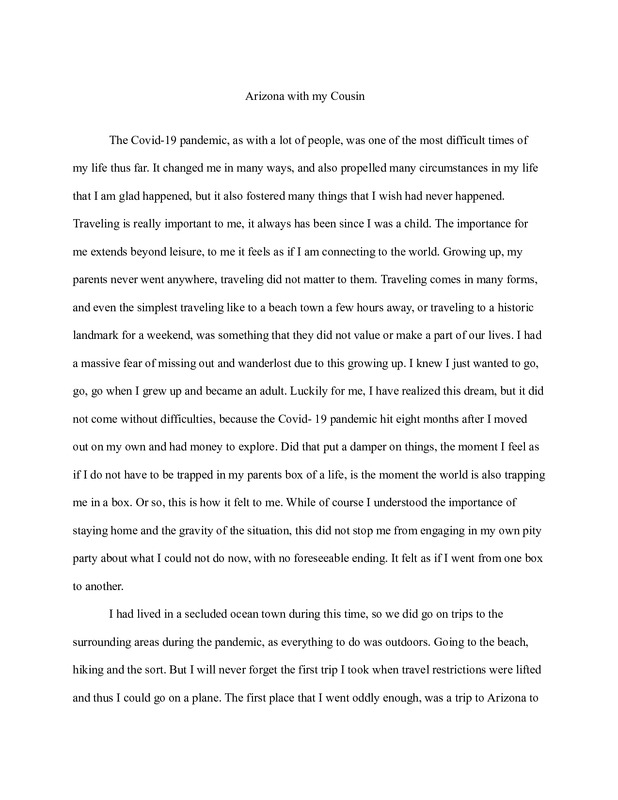 2021-05-20
2021-05-20Arizona with my cousin
This is a story about the first time I traveled post COVID restrictions lifting. This story comments on how isolating the pandemic felt to many of us and thus the importance of traveling once we were able to. This particular story is important to me because it was the first trip I had taken by myself as a newly moved out adult. -
2021-07-01
Falling In Love With Chicago
As the world slowly emerged from the grip of the COVID-19 pandemic, life began to regain a semblance of normalcy. With restrictions lifting and vaccinations becoming widely available, my family eagerly embraced the opportunity to reunite with loved ones and explore the world beyond the confines of our home. After our children became eligible for the COVID-19 vaccine, my husband and I decided to embark on a memorable journey to visit family in Chicago. The decision was influenced by the fact that Illinois had taken the pandemic seriously, and the situation seemed relatively stable. The excitement in the air was palpable as we packed our bags and set off on the adventure. The journey itself became a testament to newfound hope and optimism, a stark contrast to the anxiety-ridden days of lockdown. The rhythmic hum of the Amtrak train and the gentle swaying of the carriages created a soothing backdrop to our anticipation. After almost three days on the train, we finally reached our destination. As we settled into the rhythm of Chicago life, we found ourselves enchanted by the city's rich history and vibrant culture. The streets echoed with the footsteps of generations past, and the architecture told stories of resilience and progress. Our children's eyes widened with each new discovery, absorbing the lessons of the past and the beauty of the present. The museums became classrooms, and the parks transformed into playgrounds of learning and exploration. From the towering skyscrapers to the serene shores of Lake Michigan, Chicago opened its arms wide, inviting our family to immerse ourselves in its tapestry of experiences. Over the course of two weeks, we marveled at the diversity of the city, the pulsating energy of its neighborhoods, and the friendliness of its people. The world-class museums, the iconic Millennium Park, and the deep-dish pizzas became integral parts of our family's collective memory. The reluctance to leave grew with each passing day, as Chicago had become more than a destination; it had become a second home. The connections made, the lessons learned, and the memories forged painted a picture of a city that had welcomed our family with open arms. As we boarded the Amtrak train to return home, a mixture of gratitude and nostalgia-filled our hearts. Chicago had been a beacon of joy and discovery during a time when the world needed it most. The journey had not just been about a visit; it had been a transformative experience, a reminder that even in the face of adversity, there was always the possibility of finding beauty, connection, and a sense of belonging. The trip to Chicago amid the COVID-19 pandemic symbolizes a shift from a period of uncertainty and isolation to one of hope, reconnection, and exploration. That being said, the nervousness still set the undertone to the trip. The eligibility and administration of COVID-19 vaccinations mark a significant turning point in our family's ability to travel. It really shows the importance of vaccines as a tool for regaining a sense of freedom and the ability to engage in activities that were restricted during the height of the pandemic. The exploration of Chicago's history, culture, and landmarks communicates our desire for new experiences and rediscovery of the beauty in the world. The trip became almost like a metaphor for the broader human experience of seeking joy, adventure, and learning, even after enduring a period of hardship. As we chose to travel to a location where the pandemic was taken seriously, it is clear the new considerations the pandemic has led families to consider. This almost suggests that communities and regions that take the pandemic seriously create an environment that fosters a sense of safety and encourages responsible travel. We were so grateful to get to travel to Chicago, and it is undeniably one that we will remember forever. -
2020-03-03
Pandemic Honeymoon
Our wedding was on Leap Day, February 29th, 2020. The honeymoon followed shortly after with still whispers of a pandemic possibly looming. It was the newlywed phase of ignorance, but the pandemic was still viewed as something that wouldn't happen. We first went to Napa Valley without seeing one person wearing a mask in public. Traipsing around vineyards and imbibing on wine also helped stave off reality's harshness. When we arrived in San Francisco for the week, we realized maybe this was bigger than we realized. Walking the busy and heavily inclined streets, you would see about 50% of the people wearing masks and whipping out their hand sanitizer every so often. However, once we started walking through Chinatown, that number nearly doubled. Still, we somehow were not phased. Why would we be? We were on our honeymoon with an endless supply of matcha ice cream, dim sum, walking, sights to see, and more walking! The city was still bustling and alive; you could barely notice the Grand Princess cruise ship loitering in the bay for days, waiting for permission to dock that never came. The cancellation of a Warriors game? Oh well, our boat to Alcatraz was still ready to set sail! On the last day of our trip, we noticed a couple of restaurants closing early, with one owner asking, "Don't you know what's happening?!" On the last day of our trip, we decided to take the long drive home and go down the Pacific Coast Highway, stopping at Monterey and Carmel-by-the-Sea. In walking the streets and making our way to Monterey Bay Aquarium, we were shocked by the sight of people in hazmat suits spraying the exterior doors of the building. This image would later replay on the news once we made it home. They implemented strict lockdowns and travel restrictions within the hour of crossing back into Arizona's borders. We were so lucky we made it back home just in time and didn't realize until we made it home just how oblivious and ignorant we were. Looking back, I cringe at our naivety. Those concerned people wearing masks in Chinatown? Some of them would later become victims of racism due to COVID fearmongering. That ice cream shop we frequented? Vandalized and destroyed. That curious cruise ship at the time claimed seven lives and infected over 100 people. Once we were home safe and realized this pandemic's seriousness, we stayed home. Within a couple of weeks after returning home, we found out we were expecting, bringing even more intensity and fear. The carefree attitude and carelessness, as exhibited on our honeymoon, were now met with complete awareness of the pandemic and the strictest adherence to lockdown guidelines. We didn't travel again until our pandemic baby was two and a half years old—all of the innocence of life before COVID was forever gone. -
2022-03-11
Post Covid, Yay Hawaii!
When the COVID-19 travel restrictions were lifted, our family immediately headed for Aulani, A Hawaii Disney Resort – this was already planned as a Christmas gift (‘21) for Spring Break (‘22). In fact, upon arriving, we found out that the lockdown for the island was going to be lifted the very next day. So masks and other PPE were not necessary when moving about the exterior hotel. In fact, events around Oahu (Polynesian Cultural Center) were also relaxing C-19 measures for tourists and all guests. Small precautions were still in place, like one family in the elevators at a time, no character meet and greets (with full contact), and masking indoors. Due to Hawaii being landlocked, the importance of C-19 measures meant we all had to do our part to stay covid free. We were happy to do whatever it took. Our memories of this trip were refreshing. It was nice to get out of the house and to the islands (not the desert where we are from), experience and learn the culture of Hawaii, take in a little dose of Disney, and be mask-free, even with precautions being taken in some areas (which we were okay with). -
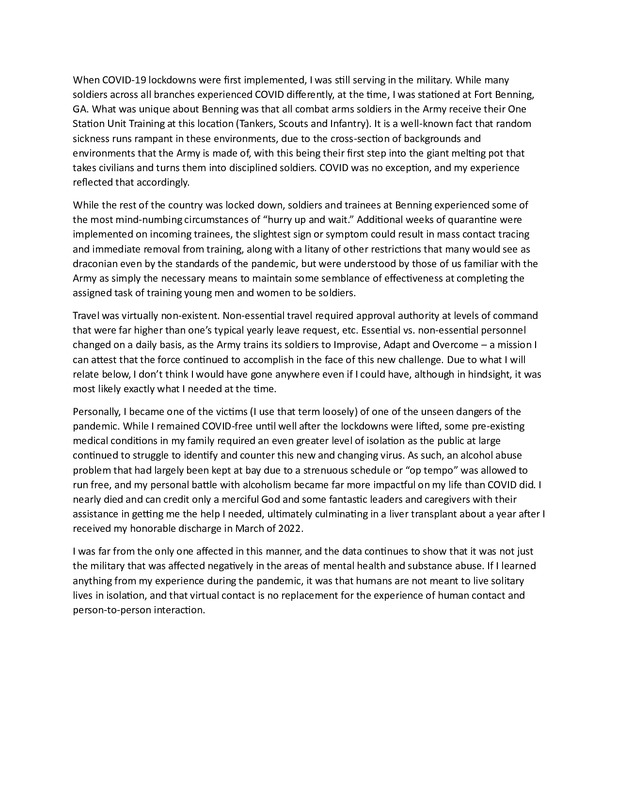 2020-03-31
2020-03-31Locked down, Locked in
I was a SSG in the US Army when the lockdown hit. The isolation let my personal demons almost get the best of me, but lessons were certainly learned and I pray we never get to that point ever again. -
2023-10-12
No Longer a Traveler
The pandemic has altered the way I view and interact with people and places. Although I have always been cautious of germs, illness, personal space, and keeping healthy, the pandemic has heightened my awareness. I am now turned off and disgusted by the thought of crowed spaces, movie theaters, gyms, airports and other places with heavy traffic. I no longer have interest in activities I once enjoyed and participated in. This has affected how I travel and how often. I once loved traveling, visiting new places, trying new restaurants, interacting with communities, and just being a “tourist”. After the pandemic restrictions were lifted, I had no interest in traveling and enjoyed being at home. Home was comfortable and safe. The first time I traveled after the pandemic was in 2022, I traveled to California to attend a conference, visit some museums and to do touristy things. I did enjoy my experiences, but it was truly exhausting. I was constantly worried that I had caught COVID or that I was going to catch it. By the end of the week, I was ready to go home and recover from the anxiety I had. It has been a year since that trip. -
0023-10-12
Happy Mother's Day 2021
In May of 2021, after nearly eighteen months of being apart, I was finally able to visit my mom and dad in Spokane, Washington. After driving five hours across Washington state, I finally arrived at my parents house. To say the least it was a very emotional greeting. When I arrived we greeted each other with many hugs and tears. Throughout the day we would just give each other random hugs, happy to be together again. My parents live in a retirement community that was very careful and followed the Covid recommendations to keep the residents safe. I was considered an essential worker as a grocery store worker. I didn't want to take the chance of exposing them to the virus since I worked closely with the public until I received the first vaccine. I also have two sisters that live in Spokane and were able to see them too. We still had to wear masks in most areas but that did not matter. Getting the family together, after such a long time, was all my mom could ask for on her special day. Happy Mother's Day. -
2022-06-30
The Road Trip 2022
Road Trip During the heat of covid, the spring of 2020 through the fall of 2022 I worked for our local school district in Arizona. My family and I did not do a lot of traveling beyond the necessary during the mandated restrictions. After the bulk of the restrictions were lifted and vaccines were widely available I participated in a work trip to San Diego to attend a convention. My partner and I decided to springboard off this and turned the summer into a west coast road trip to visit with friends and family. We started in San Diego and the highlights of this trip were Portland, Oregan, Seattle, Washington, and San Jose, California. On our jaunt along the coast there were still precautions being taken. Many people still wore masks out and were positioned with more space in public. Of the people we visited and stayed with on our journey, some were still social distancing, and taking precautions when going out. Our adventure was a good way to reconnect with the people we hadn’t been able to see during the lockdown. My partner and I were able to visit some important places from my childhood and have some epic picnics. There is a lake and small national park near my Grandparents’ home that is open to the public. The tree cover and water line is cut with an easy hiking path. We got to traverse about a mile of it. Taking in the beauty that could easily have been featured in a fairy tail description of an ancient forest. It was a great way to break the isolation and share some of the past with my partner. -
2021-04
Regret for a Trip Not Taken
This story is about travel that did not happen, but should have during the Covid-19 Pandemic. In mid-2020, my little sister Sarah was diagnosed with kidney cancer. She was married and had 3 children up in Seattle. When my family heard the news, travel was severely restricted and many people were still dying daily from the virus. I have my own wife and kids, so we all agreed that it wasn’t a good risk to go and visit. Besides, we reasoned, she hadn’t started treatment yet and she had good chances of beating cancer. So we waited it out. My sister and I talked frequently, and she told me that she was optimistic about her cancer diagnosis. Unfortunately, our Dad died in January of 2021 due to complications related to Covid (he had Parkinson’s also), and neither of us could travel to do any funeral service. In April of 2021, the pandemic had cleared up enough that most travel restrictions had ended, everyone was vaccinated, and the risk was lower. My older brother Sean had planned a trip to go to Seattle and stay there for a month to visit, help take care of kids and just be there. He urged me to go, at least for a week or so because he told me that he thought it wasn’t going as well with her treatments as Sarah had led me to believe. Because of Covid patients overwhelming hospitals, I don’t think she was getting as much good-quality medical care as she needed, though that’s my opinion. Anyway, I didn’t want to go on this trip. I don’t particularly handle death and dying well, and I didn’t want to go there and be basically sad and crying the whole time, and I was in denial about her health, so I didn’t go. A few months later, in June 2021, Sarah succumbed to cancer and died. If I could go back in time to do it over again, I definitely would have gone. I would have liked to walk around Seattle with her and take pictures to put on Facebook, our primary means of sharing memories, or take her kids out for a few hours to sight see and get to know them better. I regret, and always will, that I did not go and see her and her family there at the end. -
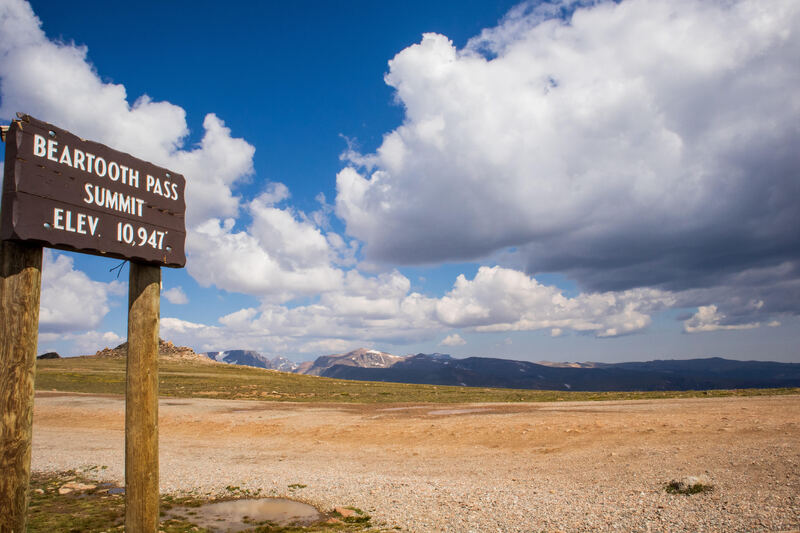 2020-07-28
2020-07-28Beartooth Pass
In late July 2020, my wife (then girlfriend), my family, and I took a trip to Sturgis, South Dakota for the annual Black Hills motorcycle rally. During the trip, we traveled to Red Lodge, Montana, where we spent two days riding our motorcycles into Yellowstone National Park. Of all the memories we made on that trip, driving on Beartooth Pass, one of the most dangerous roads in the United States, was my favorite. The views were stunning and the ride was exciting, with near-vertical dropoffs and few guardrails. In South Dakota, the only COVID-19 restriction in effect was mask mandates inside restaurants and stores; in Montana, there were no restrictions. -
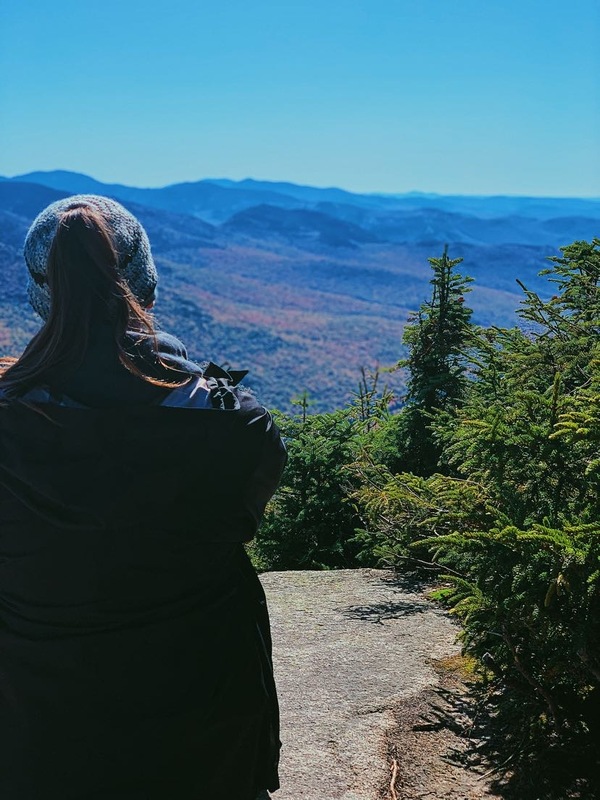 2020-05-08
2020-05-08Scaling Mountains - Overcoming Obstacles (and New Englands peaks) During the Covid-19 Pandemic
During the pandemic, I was lucky that I didn't lose anyone close to me. I know many people around me and in the world who watched their loved ones die from COVID-19. It has also had long-lasting health effects on many people as well. It is an ongoing conversation because people are still contracting the virus daily. Lockdown was a surreal moment for many in our ordinarily fast-paced world. The entire world stopped, and for once, we couldn't rely on our usual entertainment and schedules for distraction. This led to the development of new habits, which, unfortunately for me, were not just board games and binge-watching Netflix. Alcoholism had been at my doorstep since my senior year of high school, with my dependence on the substance worsening as the years passed. This is a genetic condition, and I have had countless family members struggle and die because of substance abuse, mainly alcohol. When the pandemic hit, I drank nearly every day, and this continued during lockdown with my roommate and a few friends. Not only was this dangerous because of the spreading pandemic, but it also worsened my mental health. Soon, my college shut down, and I had to move back home, where my substance abuse continued. My relationship had fallen apart when my ex moved back to India as he was on a student visa. The drinking and emotional isolation/strife led to a breakdown wherein intrusive suicidal thoughts plagued me. Something had to change; one night, I quit all substances and contacted my PCP about a mental health evaluation. I know my diagnosis was wrong, but it got me on the medication I needed to forget the intrusive thoughts and piece my life back together. My saving grace was my father and, eventually, my friends, who decided to pick me up and give me a distraction. This distraction became hiking mountains, a shared hobby of previous substance abusers. The chemicals released in the brain during these hikes and the physical exercise filled the void alcohol used to. It served it and began to heal the void left by years of mental health struggles and abuse. Like in this picture, the world's problems and my own seemed small when I was on top of a mountain. Not only that but also hiking is a very social-distance-friendly activity. The love for hiking fostered in my childhood was rekindled during the pandemic and remains one of my favorite things to do. My father and I are attempting to walk up all New England's notable peaks. -
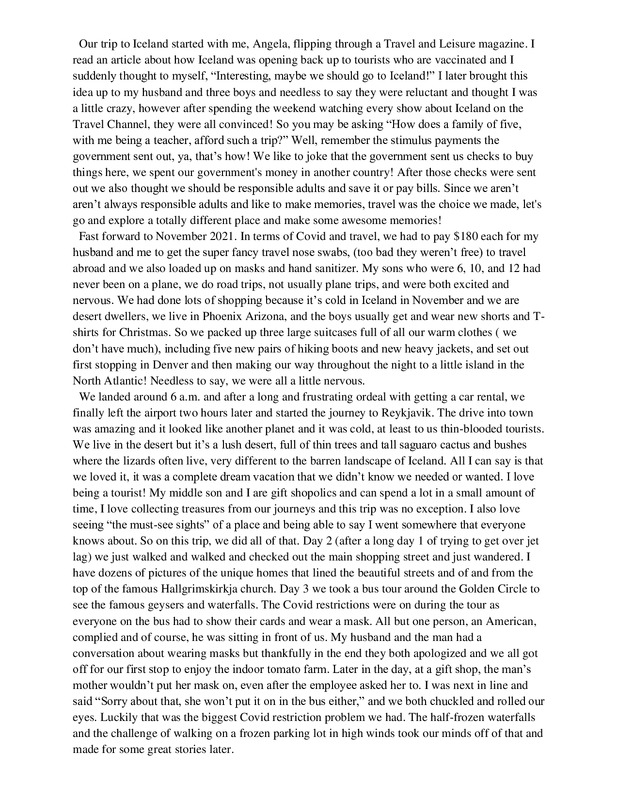 2021-11-19
2021-11-19Our Adventures In Iceland
I've written a story sharing our Covid trip to Iceland that we were able to take after the restrictions were lifted. I don't think we would have gone if the circumstances were different, it was a life-altering trip for us, something joyful in the midst of a world crisis. -
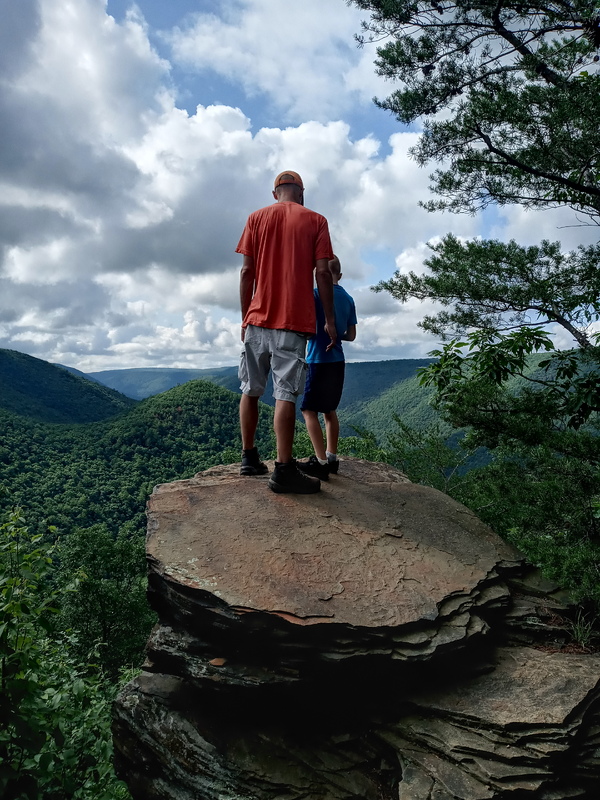 2021-05-15
2021-05-15A Measure of Peace During a Global Pandemic
During the COVID-19 pandemic I was working in health care for an agency. This meant that I traveled from facility to facility where there were staffing shortages and predominantly worked in the covid units. It was a strange experience to travel across Pennsylvania during this time and have little to no traffic that would typically have existed were there not any restrictions enacted. Therefore, when the restrictions were lifted, I did not feel an urge to travel to any great extent as I never stopped working during the lockdowns and if anything, my hours were significantly increased to the point of constant exhaustion. However, when the restrictions were lifted, I found myself in need of outdoor therapy. I am an avid hiker and enjoy the silence that trails offer. I have found that my favorite trail to visit is the Golden Eagle Trail, or as my children refer to it “Rattlesnake Ridge.” While the restrictions were lifting in most places at the time, I hardly noticed because in health care they remained for a much longer period. On many occasions in 2021, my family accompanied me to the Golden Eagle Trail to step away from society and unwind as a family without feeling the pressure of all the changes that were brought about by the pandemic. These trips provided me with lasting memories of my son reaching for my hand for security when walking along a thin train with a steep drop alongside it, my husband helping steady me across slippery rocks, and more. The photos from these trips are everlasting reminders of the happiness that hiking, especially with my family, bring me. Moments like these are to me the important moments in life. -
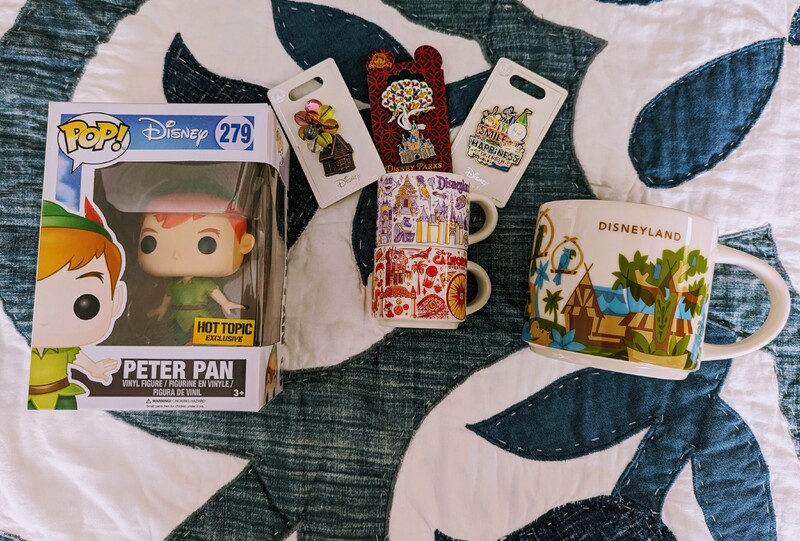 2022-03-07
2022-03-07Regaining Adventure in Disneyland
My family and I were very cautious during the pandemic and waited a long time before we chose to travel both as individual families and as an extended family unit. We finally decided to travel with a family trip to Disneyland. We have a wide range of ages in our family from over sixty-five to under ten years of age and we wanted to find a place that would have something for everyone. We appreciated the fact that at Disneyland the vast majority of the vacation would be spent outside and we all live relatively close to the location helping with travel anxieties. The fact that the place is excellently maintained helped lessen many of my family members' fears of going out for the first time. The time was very enjoyable and everyone had a wonderful time. There was still the lingering fear of not wearing a mask at all times and walking around the park without a mask did take some getting used to however it was a wonderful way to reenter the world of traveling. In reference to the photograph that I placed in the archive - The photograph does not show the park or us on the trip due to keeping our privacy. However, it helps to represent what this trip meant to my family and myself. The Disneyland Starbucks mug and pins represents the fact that we often bring back souvenirs from our trip in order to remember our time together. The Peter Pan funko is to illustrate the adventurous spirit, joy, and freedom that we had been unable to experience during the time of Covid restrictions. Finally, Disneyland holds fond memories of family, joy, and adventure as a child so it was wonderful to re-enter that world on my first experience back traveling after the exile imposed by Covid. -
2020-08-22
Yellowstone Park in 2020
It was in the late summer of 2020, and we thought that we would have the whole park to ourselves by going during the pandemic. We were wrong! It was as busy as it usually was, however people were keeping their distance from each other, and everyone was even more courteous than usual. The park required masks inside the buildings, but didn't enforce it outside. Many of the usual amenities inside the buildings were closed, and they were working with a skeleton crew. When we were waiting for Old Faithful to do its thing, many people were keeping to their own groups rather than packing in to see the geyser as they typically did before social distancing was a thing. -
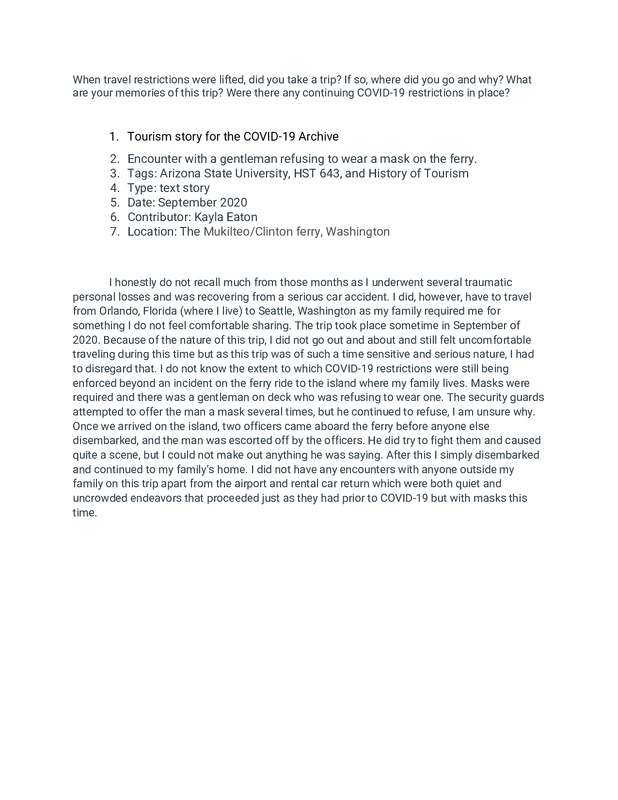 2020-09
2020-09Tourism story for the COVID-19 Archive
I am submitting a short antidote regarding an individual being upset by being asked to wear a mask on a ferry. This could be important to show how some people resisted COVID-19 restrictions, but this event's importance to me is nonexistent. -
2021-06-20
Norrish First Visit to old Home Post Covid
In the timeframe of the slow lifting of restrictions from the Covid 19 pandemic and shutdown, my family and I were less inclined to engage in travel, at least originally, than we had been before the pandemic. The luxury of just having the freedom to meet with local friends and re-engage in the simple pleasure of taking in a movie at the theater or going shopping at the mall were enough. Eventually, desire to see family that had been cut off from us because of the pandemic encouraged me to take the plunge and fly to visit my sister in my boyhood home state of Wisconsin, a place I had not visited in over twenty years. The plane trip itself was a strange mix of familiar experiences such as checking in my luggage and going through airport security combined with new experiences of wearing a mask in the airplane at all times while regularly using hand sanitizer whenever interacting with people or objects potentially infected with Covid 19. Despite being personally vaccinated, the act of traveling in this way felt both isolating and risky. To be masked up while still being in such a confined area as an airplane after the isolation of staying mostly at home for most of a year felt like a flimsy defense against the potential threat from Covid 19. Isolation from one another still seemed to be the new norm for people, with minimal conversations between strangers. Otherwise, the flight itself was uneventful. Once in Wisconsin, my sister and I spent most of the time visiting locations of my childhood. Places such as our former family farm now owned by a distant cousin, or the creek I learned to swim in or the elementary school I had attended before moving away to Arizona, which had been turned into a recycle center that looked more like a dump than a school. Much of our time was spent talking and reminiscing about the past. Essentially reconnecting in person rather than through text messages or the occasional Zoom call. When we traveled to more public locations such as restaurants, a local baseball game, or Fourth of July fireworks, it was apparent that despite health protocols being strictly followed in locations like airports, local mask regulations had been greatly relaxed. While essentially all staff members were wearing masks, the majority of patrons tended to be without masks. While hand sanitizer was available in the restroom, it seemed fewer and fewer people were using it. It was once again a strange combination of familiar experiences such as ordering a meal with the overtone of pandemic restrictions such as staff masks hovering over your shoulder like a ghost, present but less and less substantial. Overall the trip itself was enjoyable, but was mostly an opportunity to reconnect with family while at the same time reassuring myself of the relative safety to be able to travel once again. Eventually, as more restrictions were removed and the increased access to vaccines made Covid 19 less of a fear and more of a nuisance, other family trips to tourist destinations such as San Francisco or Disneyworld became once again a normal part of travel for myself and my family. But my first trip after restrictions began to relax, there was definitely a reminder that the reality of Covid still hovered over our heads, even as we began to move closer and closer to new normal in our post-Covid world. -
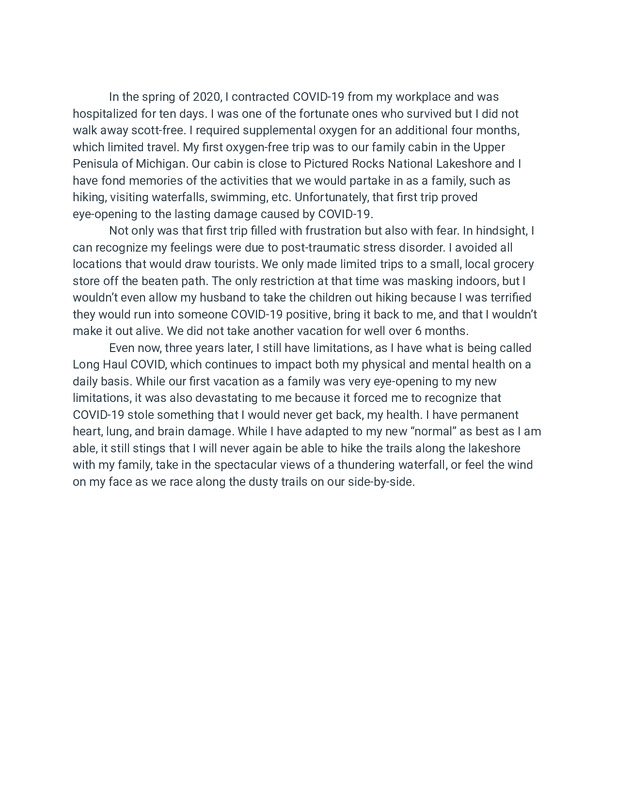 2020-08
2020-08Memories are Like Waterfalls; a Post-COVID-19 Recovery Vacation
As a survivor of COVID-19 with long-lasting damage, this memory still brings feelings of anger and fear to the surface. It takes place at a family cabin that was the epicenter of many happy memories all the way from childhood through becoming a parent myself. That first trip back forced me to see all that COVID-19 had stolen from me and would continue to steal from me for the rest of my life. -
 2021-04-28
2021-04-28Til' Death Do Us Part
I've included a text story and video of the first time I traveled since the the massive Covid lockdown in March 2020. This text and video are important to me because not only was it a brave thing to do after being confined for so long, but it was also a defining moment in my adult life. I am now married as a result of that trip. -
2021-06-08
First "Post Covid" Trip
After travel restrictions were lifted, my family and I took a trip to Pigeon Forge and Gatlinburg, Tennessee, for an early summer vacation! While we spent most of our time outdoors in the Great Smoky Mountains, we did go to a few “indoor spaces,” such as Dollywood Amusement Park, The Island in Pigeon Forge, Anakeesta, and various restaurants. We visited in June of 2021; the most evident restrictions still present were in Dollywood. While there is always a restricted number of tickets available for Dollywood due to fire and safety protocols, when they opened up after Covid, they had a very limited number of tickets to give more space and distance for the customers in the park, which was nice! There was not much waiting in lines for rides, stores, or concession stands, and we were able to keep our distance from other people. While a few smaller stores asked for masks, masks were not mandated in the two cities or any of the places listed above, and no other types of restrictions were evident in the area. My family and I did our best to stay safe and comfortable during this time and to keep the people around us safe. We chose to spend most of our time outside, surrounded by nature and wildlife!
